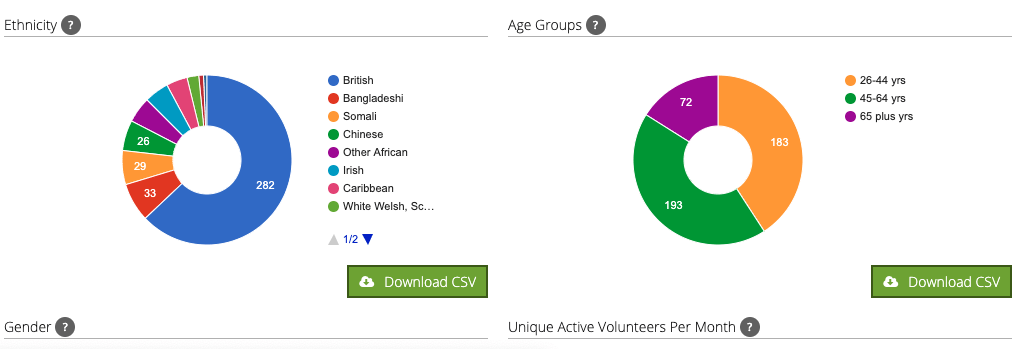Local authorities undeniably manage many volunteers, am I right?
Well, statistics show that approximately 71% of people volunteered at least once in 2019 and many of these people volunteer through their local government or organisations closely linked.
To make it even harder for those who manage and track volunteers in the public sector, these volunteers fall into many different roles in very separate parts of your organisation. Volunteers pop up in libraries, galleries, museums, parks, neighbourhoods, adult social care, sports development, environment, public health, community engagement and more. To say it’s a complicated picture is to massively understate the difficulties we know you face.
Some of the questions we know you get asked:
- Is it even possible to safely support and govern volunteers across the whole organisation?
- How do you report on volunteering as a council?
- What’s it worth to us as an organisation, what’s the business case?
Those in charge of managing services for the council and those managing volunteers in those services undoubtedly have a lot on their hands. But if the pandemic has highlighted anything over the past 18 months, it’s the essential role volunteers can play. We have seen massive public support to volunteer during these unprecedented times. In fact, the volumes of people who wanted to volunteer were overwhelming for many organisations as they did not have the infrastructure in place to cope with such an influx of new volunteers.
On top of all these complications, Local Government needs to work hand in hand with local voluntary sector partners to ensure a coherent approach to volunteering across their communities. This is a dynamic and complicated problem and we think our volunteer management software would certainly help.
What We Can Offer You…
1. Your Own Customisable Application
Yes, you read that right, with us you get to create a fully customisable, and accessible application to suit your organisation’s needs, check out the example below. You can develop an identifiable brand around your amazing volunteers and the work they do. You can set standards and rules as to what opportunities are seen via your site. You can track activity by volunteer, group, venue, by the department or service area. You can use some of our advanced mapping tools to track where volunteers are making a difference and what impact they are making at a ward-by-ward level. We provide you with the tools to empower your communities to thrive.
2. Easily Create New Opportunities
Our software enables you to create your volunteer opportunities in minutes. Not only can you create singular opportunities, but you can also calendar schedule your opportunities on a weekly or monthly basis.
It is also easier for volunteers to sign up for opportunities. With TeamKinetic available as both a native app and as a responsive design, it allows volunteers to easily access all opportunities from whichever device they choose. They can also easily filter their opportunities based upon what they are interested in i.e. museum volunteering.
We also provide ‘how-to’ videos to make it even easier for you!
That is why our software also provides you with customisable Key Performance Indicators on your volunteers. This reporting enables you to tell the story of your volunteers achievements and impact, and it lets you make informed decisions about where and who to invest in and what type of return you will get on that investment.
These reports include all the vital information you need, including:
- Pie charts on ethnicity, employment status, gender, and age of volunteers.
- The geographical spread of volunteers and opportunities.
- Web usage.
- Number of hours logged.
- Volunteer registrations (on a day to day basis.)
- The number of opportunities available.
From this, you can understand more about who volunteers most under different areas (i.e. museums, parks, libraries etc). This allows you to understand which area of volunteering is more popular to certain ages, genders and more…
4. Efficiently Communicate With Your Volunteers
With us, communication with volunteers has never been easier. No longer do you have to spend your time fumbling through spreadsheets and documents to find your volunteer contact information. You can now email or text all (or just one) of your volunteers with one click. And, to make it even better, you can send text messages scheduled for a certain time, potentially to remind volunteers about their opportunities and improve attendance.
5. Offer Rewards And Incentives
You can encourage and engage your volunteers like never before, all from using TeamKinetic. You have to option to reward volunteers with achievement badges, hour trades, and award badges; all of which are fully customisable. You can also create your very own achievement badges for your volunteers too. You can then provide volunteers with feedback, and the volunteers can give feedback on the opportunities.
So, What Are You Waiting For?
For as little as £19 a month you can have all of this and more. Perfect for managing all your volunteers in libraries, galleries, museums, parks, and everywhere else!
Book your demo tour today by emailing chris@teamkinetic.co.uk or start your free trial here.
As simple as that.









 More than £42m has been axed from councils’ sports and leisure budgets since 2010, a BBC survey has revealed.
More than £42m has been axed from councils’ sports and leisure budgets since 2010, a BBC survey has revealed.

